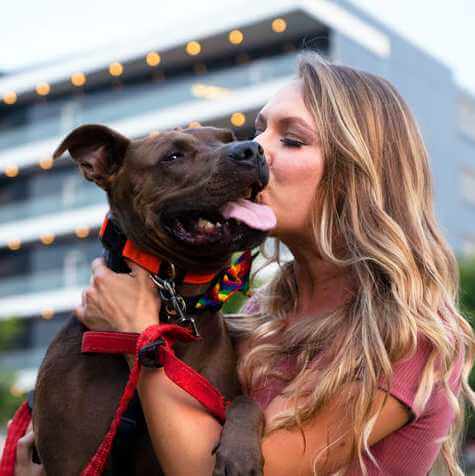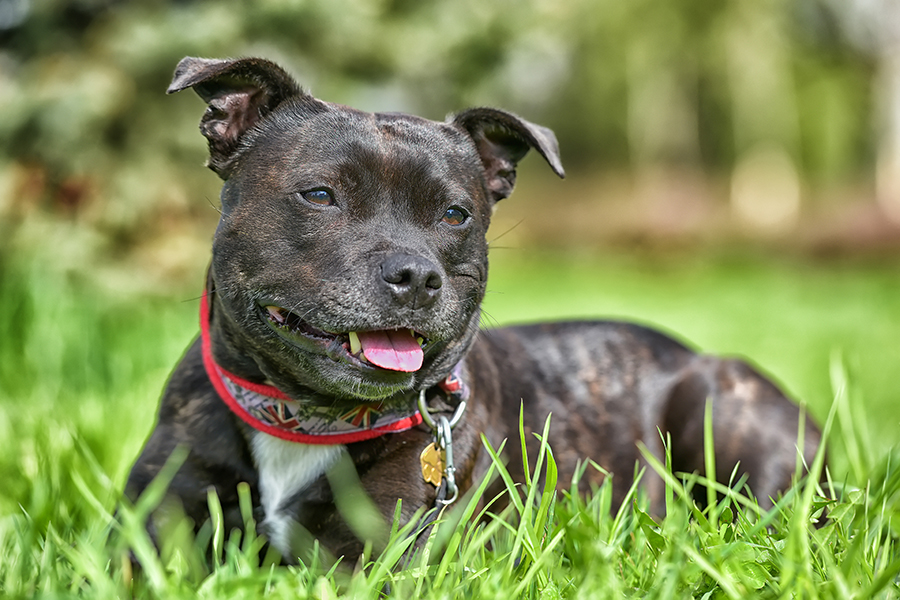In this post:
- History of Pit Bulls
- Is pitbull a breed?
- What are pitbull characteristics?
- The pitbull stigma
Many people are confused about whether or not a pitbull is a breed of dog. In fact, most people may not be able to identify a pit bull on sight correctly! Pit bulls are perhaps the most misunderstood and misidentified of all dog breeds, so in this article, we break it down for you!
History of Pit Bulls
Historically, “pit bull” was an informal and slang term used to describe any dog that was used for the cruel sport of bull-baiting. This now illegal activity used dogs to antagonize and attack large animals like bears or bulls. The large animals would be tethered in an arena, or a “pit”, and fought dogs that were thrown in with them. Thus, the term “pit bull” was born!
While the style of dog we commonly know as a pit bull was used the most for this “sport,” it’s important to remember that many different breeds were also used. In other words, “pit bull” was more of a term used to describe any dog used for bull-baiting and less of a term used to describe a specific breed or type of dog. Technically, if a husky was thrown into the pit, then it would be referred to as a “pit bull” back then.
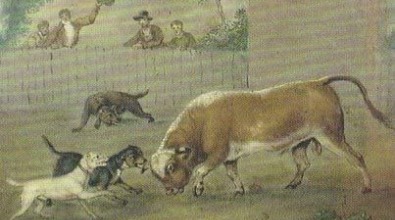
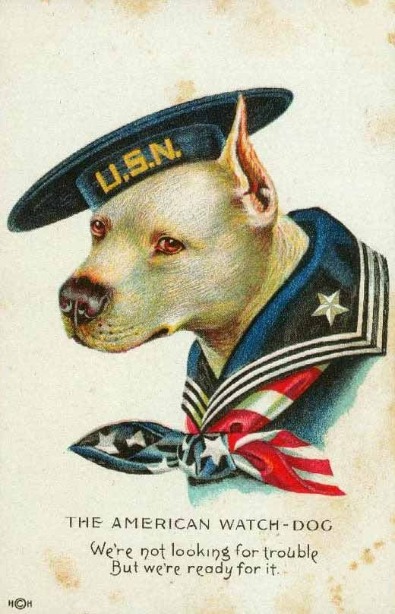
During the first half of the 19th century, Pit Bulls became a prominent part of American culture. The general public lost interest in the violent sport of fighting dogs, and pit bulls started to be seen as working-class companions. The breed was admired for its friendly nature and bravery.
Since these were attributes Americans also wanted to aspire to, pit bulls became the “All American Dog.” In fact, during WWI and WWII, Pit Bulls were used as the nation’s mascot.
After WWII, Pit Bulls began to be seen more as “regular dogs.” The vast majority of American Pit Bull Terriers were used for herding, hunting, or guardian purposes. However, most were bred and kept primarily as loving companions.
Is pitbull a breed?
A pit bull is not a breed; Pit Bull is a type. That means there is no such thing as an actual Pit Bull, which is confusing to a lot of people.
American Pit Bull Terrier, Staffordshire Terrier, and Staffordshire Bull Terrier are the three main purebred types of Pit Bulls. However, there are no such things as an actual Pit Bull as a breed.
Today there are at least 5 breeds of dogs that are commonly misidentified and lumped into the category of the pitbull-type dogs: the English bull terrier, the American bulldog, and the boxer. “Pitbulls” or “pit bulls” are not recognized as a breed by the American Kennel Club (AKC). The United Kennel Club does recognize a breed known as the “American pit bull terrier.”
What are pitbull characteristics?
Dogs that are called pit bulls usually have a square, block-shaped hear. Their fur is wiry, and they can weigh between 35 – 70 pounds. However, again, since Pit Bull isn’t a breed, that varies so much that people are perplexed about what a Pit Bull is when they are labeling them in shelters.
Pit bull-type dogs’ temperament
What most people love the American Pit Bull Terrier, the American Staffordshire Terrier and the Staffordshire Bull Terrier is that they are characteristically loyal, loving, and incredibly tender dogs. What most people don’t know is that the American Pit Bull Terrier scored higher than the Collie and America’s favorite Golden Retriever in the temperament testing system.
The American Temperament Test Society, Inc. (ATTS) is a national non-profit organization for the promotion of uniform temperament evaluation of purebred and spayed/neutered mixed-breed dogs. Failure on any part of the test is recognized when a dog shows panic, strong avoidance without recovery, or unprovoked aggression. Here are some pass rates:
- American Pit Bull Terrier: 87.4%
- Staffordshire Bull Terrier: 91.2%
- American Staffordshire Bull Terrier: 85.2%
- Golden Retriever: 85.4%
- Collie: 80.6%
- Lhasa Apso (King and Pumpkin!!): 70.4%
A survey was done by Brian Hare, an associate professor of evolutionary anthropology at Duke University in North Carolina and a member of the Center for Cognitive Neuroscience, a division of the Duke Institute for Brain Sciences. The results showed that “the American Pit Bull Terrier consistently ranked as one of the least aggressive dogs, with the exception being toward new dogs, where it was still below Miniature Schnauzers.”
The pitbull stigma
“Breed-specific legislation gets in the way of a lot of things where I can’t just walk down in the street with Baxter and enjoy my day as if I were walking down the street with Zoey who’s hairier or hound type dog. When I am walking with Baxter, I have to constantly think about what other people might think of him, just because of the way he looks, which is ridiculous. He’s a great dog just like any other. So, when you are out in public with your dog you have to, not only be educated about the stigma or the myths that surround your dog, you have to be able to take that and convert it and just show people that they are no different than any other dog. So you constantly being an advocate, you consistently speaking out for the dogs.” – Jeffrey “Pitbear” Loncosky
Animal shelters across America today are moving away from trying to identify any dogs by breed because sight identification has proven to be extremely unreliable. Many different combinations of breeds can look like a “pit bull.” Since there is so much discrimination against these gentle dogs, removing the label in shelters can help them find forever home much more quickly!
Special thanks to:

Deirdre “Little Darling” Franklin is the founder, president, and soul behind Pinups for Pitbulls. She holds a master’s degree in public policy from Drexel University, where she specialized in breed-specific legislation. She is also the Volunteer & Foster Manager for the ASPCA Behavioral Rehabilitation Center in Weaverville, NC.
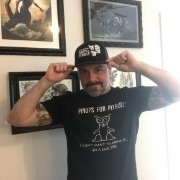
Jeffrey “Pitbear” Loncosky
Jeffrey “Pitbear” Loncosky is the Treasurer and Shipping guru at Pinups for Pitbulls. He is a pit bull-type dog owner and is an advocate against BSL and breed prejudices. He holds a Bachelor of Business Administration from Temple University with a concentration in Finance. He owns a financial consulting company and is a tattooer and musician as well.

